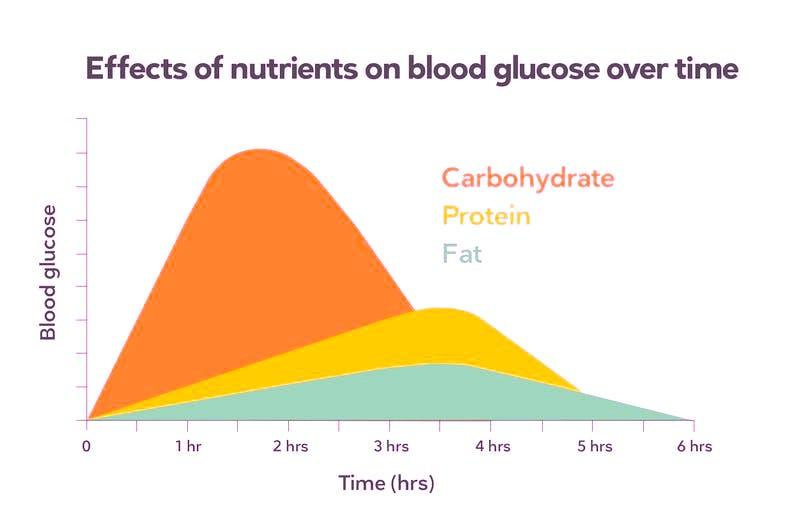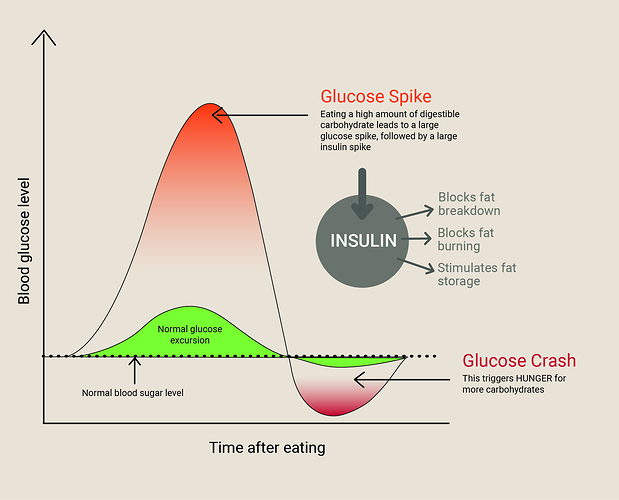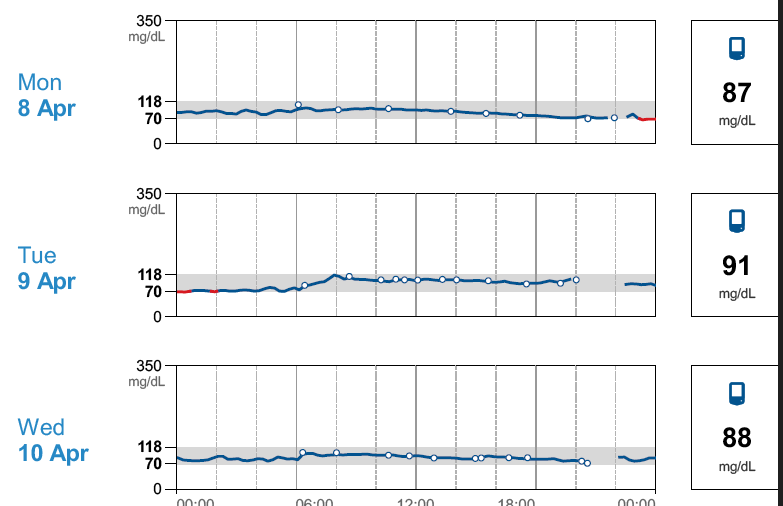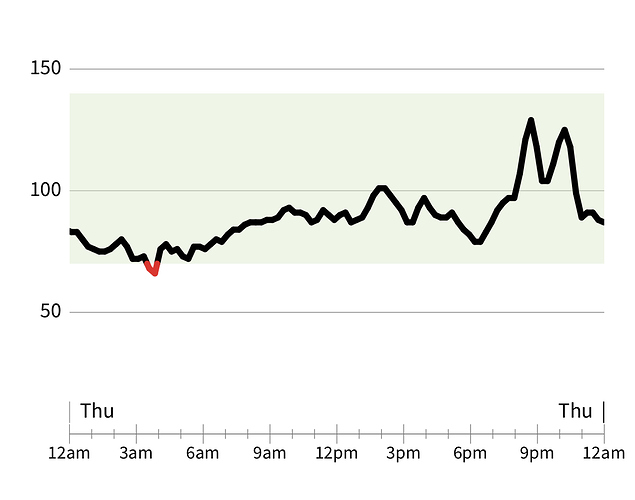For example I would like to see how many blueberries I can have without being kicked out of keto. How soon to test after having them?
How soon to keto/glucose test after eating questionable food?
I found this showing the effects of different nutrients on postprandial blood glucose levels. I assume the end of those spikes would be when you would be in ketosis again. I think the response would vary depending on how insulin resistant you are, so measuring your response against this might show where you are on that spectrum.
This is the website I got it from: https://www.breathewellbeing.in/blog/post-prandial-blood-sugar-test-or-pp-test-how-to-control-spikes-after-meals/
I also found this which I think is what would happen if insulin is not able to do it’s job properly. What I mean is, the previous image does not show blood sugar dropping below baseline, but if it did that might be what is contributing to longer glucose excursions after a meal. It would also be contributing to the need for gluconeogenesis sooner than normal.
I can’t get to my CGM data right now, but for me, a high carb meal (bread and potatoes) causes my blood sugar to spike and be back at normal within an hour. Protein or fat does nothing whatsoever to blood sugar.
I can access this, but this is when eating keto (and the morning rise on Tuesday is due to exercise):
I have seen crashes, after ice cream for instance. Probably why I get hungry after that.
Thank you.
Somewhat on the same topic, dr. Michael Greger says that the way a food is cooked/consumed can make a difference in the glucose spike. He is not a keto supporter, but advocates reducing carbs. For example one thing I remember: eating freshly baked potatoes creates a big glucose spike, but placing them in the fridge and eating them cold later flattens the glucose curve. He also said that adding some greens to other offending foods can decrease their bad impact, but can’t remember any example of such a case.
If insulin is so high that there is a glucose crash, then there won’t be any gluconeogenesis until insulin comes back down. (This can take hours longer in a person who is insulin-resistant.) The threshold, according to Ralph DeFronzo and his team, is 25 μU/mL. Above that, we are in glucose-burning and fat-storing mode. It isn’t until insulin drops below that level that the liver can start to make glucose and ketones. Gluconeogenesis and ketogenesis are stimulated by glucagon and inhibited by insulin.
In the case where there is an abundance of glucose (i.e., carbohydrate) in the diet, glucagon is not secreted, and insulin is secreted to manage the excess of glucose in the blood stream. At the point where someone is insulin-resistant enough that glucose control is starting to slip (which is the diagnostic criterion for Type II diabetes), it takes a long time for insulin to drop. That’s one reason Richard and Carl set their recommended carb limit at 20 g/day. It is low enough that when we eat that little an amount of carbohydrate for a day or two, serum glucose will drop low enough to permit a lower secretion of insulin. But some people are so insulin-resistant that even such a small dose of carbohydrate can stimulate insulin to take them above the threshold into glucose-burning and fat-storing.
This is based on the notion of resistant starch. Commercial resistant starch is an inexpensive synthsised fibre substitute, used to increase the fibre content of processed foods. However, about 2.5% of the starch in a cooked potato is naturally-formed resistant starch. By engaging in a complicated procedure of cooling and reheating, it is possible to increase that percentage to about 2.8% of the total starch in the potato. But the reheating must be done carefully, or the resistant starch breaks back down into regular digestible starch.
Blueberries are fine, don’t waste the strips. Don’t worry about being “kicked out” either, waste of your time. Eat right and you’ll be fine.
Fructose and Glucose don’t act the same. If you question something that could actually have an effect that matters, you check before you eat, and until you return to baseline up until 2hrs.
Also don’t get into the thing where every transient rise in glucose is a “spike”, it’s not. Rises will happen, and they’re supposed to. Your time returning to normal is far more important that the rise itself.
I love my blueberries, I always keep a bag of frozen if I can’t get fresh. I test 1hour after and then again 2 hours, just how I learned. Hope I’m doing it right  I just do a quarter cup a day, for me that doesn’t spike on me and I do them with Two Good Yogurt (1/2 cup) and walnuts chopped (1/4 cup). Might be able to eat more but that fills me up so haven’t tried more.
I just do a quarter cup a day, for me that doesn’t spike on me and I do them with Two Good Yogurt (1/2 cup) and walnuts chopped (1/4 cup). Might be able to eat more but that fills me up so haven’t tried more.
But I’ve read that some people are affected differently than others with their food and drink?? I think testing in the beginning, until you know is best imo.
After looking at what I posted yesterday, I think I fasted all day Monday and then exercised on Tuesday. How do I know? The red indicates “low” blood sugar. That usually happens only happens when I fast. So, I worked out on Tuesday being fasted 32+ hours.
@Goldengirl52 People do experience glucose reactions to food differently. Saw a study from Israel where they gave people CGMs and tried to recreate the glycemic index. It was a disaster. Not only did different people have vastly different reactions to the same food, but sometimes the same people had different reactions to the same food.
I’m not against fruit, but after not having it for so long, I don’t really see a need to have it. I don’t mind blueberries at times, but I can live without them too.
Oh yeah, my peaks look at lot like @Fracmeister’s: up and down in a short time. Both of ours are up and down in about an hour.
I don’t understand why I would monitor my glucose at all. Because I am already doing everything I can. But maybe if I had diabetes or another health issue, it would mean something to me…? But it seems peaks and drops and spikes are normal?
Some of us are engineers and love to test everything, want to know how things work. 
I paid for a year’s supply of CGMs out of pocket. You can learn a ton. Do you think you get a blood sugar change to protein? Test it. What about coffee? What about popcorn? Salsa? What happens overnight? While fasting? What happens when you exercise?
At one time, the common thought was that protein was like eating a candy bar. In fact, I bought my CGM so that I could prove that high protein = high blood sugar. The problem was that I never once saw higher blood sugar from protein, and I ate 160+ grams of protein in single meals.
Now, if you have an issue with glucagon, you could get lower blood sugar. Jimmy Moore tried high protein and got hypoglycemia.
But if you’re not diabetic and have no issues, and don’t want to test theories like protein = high blood sugar, then there’s probably not a reason to get a CGM or test.
I was prediabetic in 2018 but the clinic never alerted me, and I hadn’t got online with My Chart so I had no clue til Jan. 2021  Of course I don’t think people expect it around where I’ve lived unless their way overweight which I just wasn’t. There are other signs I can think of and know now though.
Of course I don’t think people expect it around where I’ve lived unless their way overweight which I just wasn’t. There are other signs I can think of and know now though.
One probably should just continually monitor glucose before, during, and after eating everything and nothing, also whilst sleeping. If Ketosis halts, it’s sure fire death.

In all seriousness, not sure. Ain’t it like a 2 hour thing, to ensure insulin is back at “normal” levels?
I’m such a boring eater to some because I eat the same things I did when I started 20 months ago. I don’t get tired of the foods so why change. I know what the meals do and none of my meals normally spike my bg so I don’t have to test but get my regular A1c’s done.
Never understood this “your food is boring” thing. It’s food. It should be right for the one in question, it doesn’t need to be entertaining for someone else (or even for the one in question if they aren’t me  And I can be entertained without huge variety myself though some is needed.)
And I can be entertained without huge variety myself though some is needed.)
If it works, why to fix it? People are weird, I always say.




